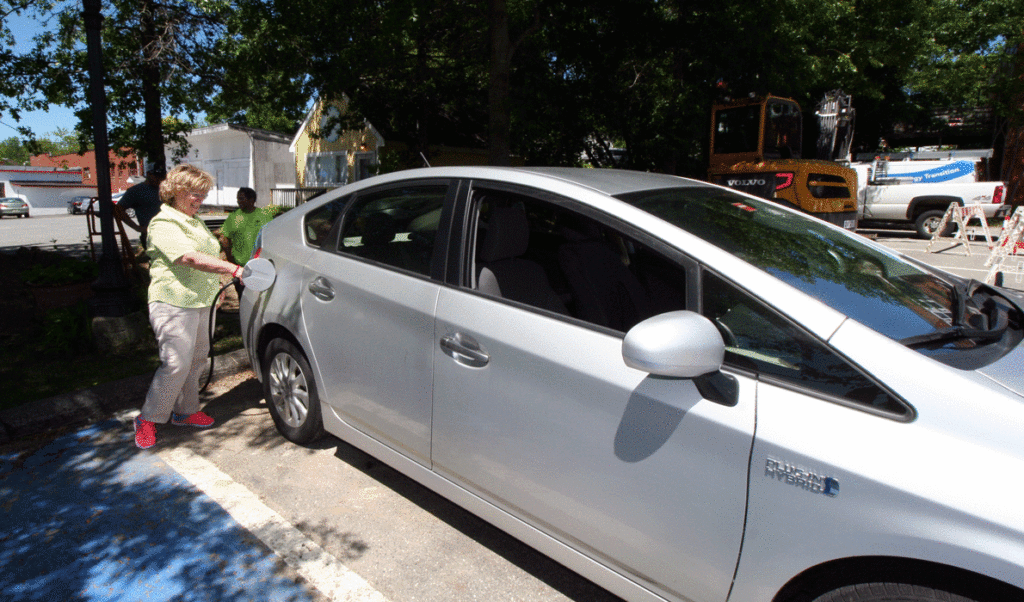On June 26, Ellsworth City Council Chairman Marc Blanchette backed up his plug-in hybrid electric car to the city’s first publically available Level 2 electric vehicle charging station, located under a shady copse at Merrill Park on Water Street.
Blanchette’s wife, Diane, had the honor of taking the first plug-in from the new charger, accompanied by applause from city staffers and ReVision Energy’s installation team, Seth Kiernan and Bill Levay.
The site is ideally located, said Ellsworth Assistant Planner Steve Fuller, because it’s away from traffic but close enough to the downtown that folks charging their cars, which can take an hour or two on a Level 2 charger, can fold the time into a downtown outing.
The charger is one of a series recently installed by A Climate To Thrive, or ACTT, a group of Mount Desert Island residents, businesses, and towns working to achieve energy independence by 2030.
To support what’s expected to be a coming wave of electric vehicles, ACTT is working with municipalities and nonprofits to identify best locations for publicly accessible charging stations. The goal is to help develop a robust charging infrastructure on Mount Desert Island and throughout eastern Maine. ACTT supplies the hardware and covers the cost of equipment and installation for municipal and nonprofit hosts. Hosts supply the parking spaces, and they own and operate the installed charging stations, paying for the electricity.
Gordon Beck, ACTT’s manager on this project, said ACTT received a grant late last year from an anonymous foundation interested in making the technology accessible to more of Maine’s rural areas.
The first charger was installed in downtown Belfast, in May. In addition to Ellsworth, other installations included Eastport City Hall, Southwest Harbor, and the Acadia Welcome Center in Trenton.
Discussions are also underway in Machias and Calais. Challenges that can slow approvals for installations include site selection and concerns over potential liability and the cost of electricity.
The corridor is designed to allow drivers to easily recharge along the coast, he said.
Chargers can be found through apps like PlugShare.
“More chargers are coming online all the time,” he said. “We’re at the beginning of the movement, so to speak.”
The cost of the charger plus installation can range from about $2,000, installed on the side of a building, to $10,000 if excavation and construction is involved. That cost is covered by ACTT. The cost of electricity depends on the usual rate the town pays for supply. That averages $1 per hour of charging. For now, charging is free for the ACTT devices. A “network charger,” like one installed in Northeast Harbor, requires a credit card swipe payment of $1.50 per hour; that money reimburses the town for electricity usage, Beck explained.
At ACTT’s June 2 EV symposium in Ellsworth, Greater Portland Council of Governments Clean Communities Coordinator Ben Lake explained the charger levels. Level 1 is a 120-volt residential outlet providing 5-8 miles of range per hour; a full charge takes 8-12 hours. Level 2 is a 220–240 volt system, providing 10-24 miles of range per hour, with a full charge taking 2-6 hours. Level 3 is a 480 volt system that charges batteries to 80 percent capacity in 20 minutes or less, providing 70-340 miles of range per hour.
Consumers may be reluctant to buy EVs due to considerations like higher initial cost, charging time, and “range anxiety,” Lake said.
Batteries are the most expensive part of EVs.
“But the cost has dropped dramatically over the past decade, and it’s expected to continue to drop in the next five years,” he said.
Charging time and range anxiety can be overcome with more Level 3 installations, he said. That’s what the state is going for, as it begins this year to use $3.15 million of its $22 million VW settlement fund to install Level 3 chargers along the following priority corridors:
I-95/I-295 from Kittery to Bangor
Route 201 from Fairfield to Quebec Border
Route 1 from Brunswick to Ellsworth
Route 2 from Newport to New Hampshire
Route 3 from Bar Harbor to Bangor
Route 302 from Portland to New Hampshire
The Efficiency Maine Trust is administering the initiative. Michael Stoddard, executive director of Efficiency Maine, said bids for host sites will be solicited this summer and installations are expected to begin late this year.
ACTT has more plans in the works, too, and hopes to receive further funding to extend Level 2 corridors further downeast and toward Bangor.
“The more research we’ve done, the more convinced I am that this is where we’re all headed,” Beck said. “Every week you read about different automobile manufacturers getting into electric vehicles. They might be plug-in hybrids that still have gas engines, or they might be getting into full batteries, like Tesla. It just seemed to be a logical step to say, Well, if we can build out some charging infrastructure, it will make it a lot easier for people to move to cleaner electric vehicles.”





